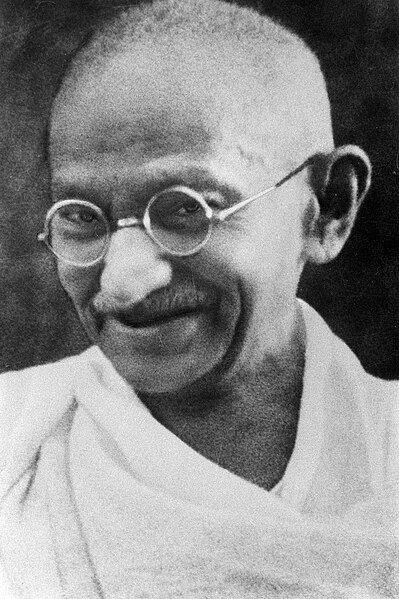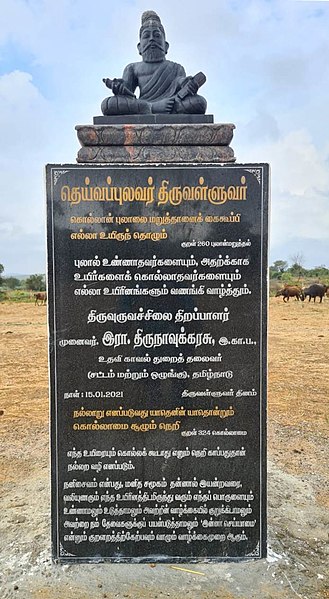Ahimsa is the ancient Indian principle of nonviolence which applies to actions towards all living beings. It is a key virtue in Indian religions like Jainism, Buddhism, Hinduism, and Sikhism.
Lord Mahavira, the torch-bearer of ahimsa
The 5th-century CE Tamil scholar Valluvar, in his Tirukkural, taught ahimsa and moral vegetarianism as personal virtues. The plaque in this statue of Valluvar at an animal sanctuary at Tiruvallur describes the Kural's teachings on ahimsa and non-killing, summing them up with the definition of veganism.
Gandhi promoted the principle of ahimsa by applying it to politics.
The hand with a wheel on the palm symbolises the Jain Vow of Ahimsa. The word in the middle is Ahimsa. The wheel represents the dharmacakra which stands for the resolve to halt the cycle of reincarnation through relentless pursuit of truth and non-violence.
Nonviolence is the personal practice of not causing harm to others under any condition. It may come from the belief that hurting people, animals and/or the environment is unnecessary to achieve an outcome and it may refer to a general philosophy of abstention from violence. It may be based on moral, religious or spiritual principles, or the reasons for it may be strategic or pragmatic. Failure to distinguish between the two types of nonviolent approaches can lead to distortion in the concept's meaning and effectiveness, which can subsequently result in confusion among the audience. Although both principled and pragmatic nonviolent approaches preach for nonviolence, they may have distinct motives, goals, philosophies, and techniques. However, rather than debating the best practice between the two approaches, both can indicate alternative paths for those who do not want to use violence.

Mahatma Gandhi, often considered a founder of the modern nonviolence movement, spread the concept of ahimsa through his movements and writings, which then inspired other nonviolent activists.
Petra Kelly founded the German Green Party on nonviolence
Gandhi famously advocated for the Indian independence movement to strictly adhere to the principles of nonviolence.
The Semai have principle called punan, which includes nonviolence







